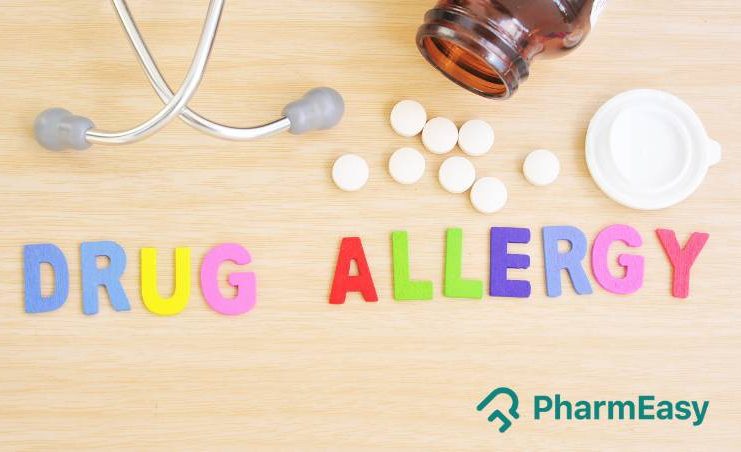Drug allergy – Symptoms, causes & treatment
By Dr. Mayuri Pandey +2 more

Get more insightful and
helpful tips to
treat Diabetes for FREE



Download PharmEasy App




Register to Avail the Offer
Send OTPBy continuing, you agree with our Privacy Policy and Terms and Conditions
By Dr. Mayuri Pandey +2 more
Table of Contents
This blog attempts to present the hidden allergies when medications become adversaries. An untoward reaction after taking any medicine is referred to as a drug allergy.1 Clinical classification of drug allergies is an immediate reaction (this type of drug allergy is visible after 1-6 hours of taking the drug) and non-immediate reactions (these reactions appear more than one hour after taking the drug).2 Understanding the underlying causes of drug allergies is important to identify and manage these reactions effectively. If you suspect a drug allergy, seeking medical attention is crucial for proper diagnosis and treatment.
If anyone is experiencing the below-listed symptoms then they might be experiencing drug allergies. Drug allergies can be experienced immediately after ingesting the drug or even after several hours of taking the drug.

Some of the symptoms of a drug allergy can be life-threatening and require urgent medical care.1
The exact cause of drug allergies is not fully understood, but there are several factors that can contribute to their development. Here are some potential causes:
A physician thoroughly examines the patient’s medical history and symptoms in order to identify drug allergies.1
Relieving symptoms and preventing a serious reaction are the two main objectives of treatment.3
A medication allergy can typically not be avoided.
Also Read: What Happens If You Eat Mold: Decoding the Potential Health Risks
An allergic trigger can cause anaphylaxis, a severe and perhaps fatal reaction. Anaphylaxis occurs when the immune system, which is the body’s natural defense mechanism, overreacts to a particular stimulus, which is not necessarily always an allergen.
Some common triggers for anaphylaxis include:
Sometimes, there is no obvious trigger for anaphylaxis, and this is referred to as idiopathic anaphylaxis.10
In conclusion, it is essential to be aware of the potential risks and symptoms associated with drug allergies. By recognizing the signs, seeking prompt medical attention, and communicating effectively with healthcare professionals, individuals can better protect themselves from adverse reactions. Remember, knowledge is power when it comes to managing drug allergies and taking proactive steps can lead to safer and more effective medication use. Stay informed, stay vigilant, and prioritize your health and well-being.11
Disclaimer: The information provided here is for educational/awareness purposes only and is not intended to be a substitute for medical treatment by a healthcare professional and should not be relied upon to diagnose or treat any medical condition. The reader should consult a registered medical practitioner to determine the appropriateness of the information and before consuming any medication. PharmEasy does not provide any guarantee or warranty (express or implied) regarding the accuracy, adequacy, completeness, legality, reliability or usefulness of the information; and disclaims any liability arising thereof.
Links and product recommendations in the information provided here are advertisements of third-party products available on the website. PharmEasy does not make any representation on the accuracy or suitability of such products/services. Advertisements do not influence the editorial decisions or content. The information in this blog is subject to change without notice. The authors and administrators reserve the right to modify, add, or remove content without notification. It is your responsibility to review this disclaimer regularly for any changes.
The term medicine allergy is frequently used. More accurately it refers to adverse drug reactions.4
Drug allergies are largely influenced by genetic predisposition.5
Drug allergy symptoms range from mild pain to life-threatening symptoms.1
Yes! The children are less affected by the drug allergy. In elderly patients, the prevalence of drug allergies can increase up to 30%, and they tend to be more severe.
An allergy blood test needs no extra preparation on your part.7
1. Drug Allergy: Symptoms, Diagnosis & Treatments [Internet]. Available from: https://my.clevelandclinic.org/health/diseases/8621-medication-allergies
2. Drug Allergies | World Allergy Organization [Internet]. Available from: https://www.worldallergy.org/education-and-programs/education/allergic-disease-resource-center/professionals/drug-allergies
3. Drug allergies: MedlinePlus Medical Encyclopedia [Internet]. Available from: https://medlineplus.gov/ency/article/000819.htm
4. Drug Allergy | AAFA.org [Internet]. Available from: https://aafa.org/allergies/types-of-allergies/medicine-drug-allergy/
5. [Genetic predispositions in drug allergy: the role of HLA] – PubMed [Internet]. Available from: https://pubmed.ncbi.nlm.nih.gov/24834645/
6. Drug allergy: an updated practice parameter – PubMed [Internet]. Available from: https://pubmed.ncbi.nlm.nih.gov/20934625/
7. Allergy Blood Test: MedlinePlus Medical Test [Internet]. Available from: https://medlineplus.gov/lab-tests/allergy-blood-test/
8. Yazicioǧlu M. Approach to drug allergies in the childhood. Turkish Archives of Pediatrics/Türk Pediatri Arşivi [Internet]. 2014;49(2):99. Available from: https://www.ncbi.nlm.nih.gov/pmc/articles/PMC4462278/
9. Drug Allergies | Reactions, Symptoms & Treatment | ACAAI Public Website [Internet]. Available from: https://acaai.org/allergies/allergic-conditions/drug-allergies/
10. Anaphylaxis – NHS [Internet]. Available from: https://www.nhs.uk/conditions/anaphylaxis/
11. Medical error reduction and prevention – statpearls – NCBI bookshelf [Internet]. Medical Error Reduction and Prevention. 2022 [cited 2023 May 19]. Available from: https://www.ncbi.nlm.nih.gov/books/NBK499956/
12. Medications and drug allergic reactions [Internet]. American Academy of Allergy Asthma & Immunology. 2020 [cited 2023 May 19]. Available from: https://www.aaaai.org/tools-for-the-public/conditions-library/allergies/medications-and-drug-allergic-reactions
Comments